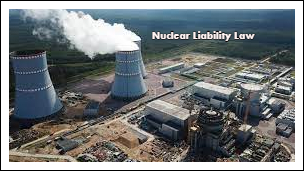News
India’s Nuclear Liability Law: Protecting Victims and Ensuring Accountability
Published
1 year agoon

In the event of a nuclear accident, Indian nuclear liability law ensures that victims receive fair compensation. It establishes a legal framework in which operators, suppliers, and victims can file damage claims
Introduction
The Civil Liability for Nuclear Damage Act (CLND) of India is a law that establishes the legal framework for dealing with liability in the event of a nuclear incident. This legislation is in charge of determining compensation for those harmed by the incident and holding nuclear facility operators accountable for any damage caused. Despite its goal of protecting citizens and the environment, the law has been fraught with difficulties and debate.
Understanding Nuclear Liability: Who Is to Blame for Nuclear Accidents?
Nuclear liability refers to the legal obligation of a nuclear facility’s operator or supplier to assume responsibility for any harm or damage caused by a nuclear incident. This type of liability typically includes compensation for loss of life, bodily harm, property damage, and environmental harm caused by the release of radioactive substances or the occurrence of a nuclear accident.
Nuclear liability laws in many countries provide a structure that ensures adequate compensation for impacted individuals and a fair distribution of financial obligations among liable entities, including the operator or supplier of a nuclear power plant.
Understanding India’s Nuclear Liability Law’s Importance
To create a legal framework that ensures just and speedy compensation for victims of nuclear accidents, a nuclear liability law is necessary. In the event of a nuclear accident, a law like this makes sure that the impacted people or communities are fairly compensated for harm done to their health, property, and the environment. Without such a law, victims might not receive adequate compensation, which would result in additional injustices and difficulties.
By establishing a clear liability regime for investors, operators, and suppliers, nuclear liability law promotes investment by reducing uncertainty and allaying concerns of foreign suppliers.
In order to cooperate with other nations in the nuclear industry and adhere to international standards, India needs a nuclear liability law.
Legal accountability: In order to establish legal responsibility for operators and suppliers of nuclear facilities and to foster a culture of accountability, nuclear liability laws are required. The liability law would hold them responsible if safety precautions were not taken and an accident occurred, with consequences including financial penalties or legal action.
Nuclear liability laws are necessary to ensure the security of the nuclear power industry by establishing a framework for legal and financial liability that discourages negligence and promotes safer operations. This will motivate operators to prioritise safety precautions and abstain from cutting corners in order to minimise any damages brought on by a nuclear accident.
Read Also:- India and the United Kingdom will collaborate to establish the ‘NET Zero’
The expansion of India’s nuclear power programme, which includes the construction of ten new reactors and the approval of ten more, emphasises the importance of a comprehensive nuclear liability law to ensure the safe and responsible operation of these facilities.
Understanding India’s Civil Liability for Nuclear Damage Act’s Key Provisions
The Civil Liability for Nuclear Damage (CLND) Act was passed in India in 2010 to establish a legal framework for liability and compensation in the event of a nuclear accident. The Act outlines the responsibilities of nuclear plant operators, suppliers, and the government, ensuring that affected individuals and communities are compensated fairly and promptly.
Important clauses in the Civil Liability for Nuclear Damage (CLND) Act of India
Operators of nuclear plants are responsible: According to the Act, the primary party in charge of compensating victims in the event of a nuclear accident is the operator of the nuclear plant. As a result, the operator is subject to “strict liability,” which mandates that they must pay damages whether or not they were at fault.
The Act sets a ceiling of INR 1,500 crore as the operator’s maximum financial liability in the event of a nuclear incident. The central government is obligated to provide additional funds up to the value of 300 million Special Drawing Rights (SDRs), or roughly INR 3,300 crore, if the compensation amount exceeds this cap.
Regarding supplier liability, Section 17 of the Act gives the operator, in certain situations, the right to sue the supplier. The right of recourse may be exercised if the operator and supplier’s contract contains such clauses, if the supplier’s negligence caused the incident, or if the supplier provided the defective goods or services that resulted in the incident. This clause encourages suppliers to place a high priority on safety and to share any liabilities that may arise from a nuclear accident.
A Claims Commission would be established under the CLND Act to deal with claims resulting from nuclear incidents. Claims for bodily harm or death have a time limit of 20 years from the date of the incident, while claims for property damage have a time limit of 10 years.
The CLND Act requires nuclear power plant operators to obtain liability insurance or financial security to cover their liabilities, ensuring that compensation funds are available in the event of a nuclear accident.

What steps can be taken to ensure proper nuclear liability?
Strengthen the India Nuclear Insurance Pool (INIP) by increasing its funds to match the CLNDA’s mandated liability amount. Encourage more insurance companies to join and contribute to the pool, resulting in a more resilient risk transfer mechanism.
The liability caps for operators and suppliers should be reconsidered to see if they are adequate to cover potential damages from a nuclear incident. To provide an informed comparison, this evaluation should take into account international standards and practises.
Increase reinsurance support for nuclear risk liability by looking into options like collaborating with international reinsurance markets and encouraging domestic reinsurers to participate in nuclear risk coverage.
Increase the effectiveness of regulatory bodies such as AERB by improving their monitoring and enforcement capabilities to ensure nuclear power plants comply with safety standards and guidelines.
Clarify legal provisions by stating the applicable laws as well as the extent of liability for suppliers and operators in the event of nuclear damage. This would help to remove uncertainties and provide clear guidelines for the CLNDA’s implementation.
Encourage international cooperation: To address Nuclear liability laws issues, India should collaborate with other countries and actively participate in global forums to share knowledge, best practises, and technical expertise. Joining international treaties and conventions, such as the Convention on Supplementary Compensation for Nuclear Damage (CSC), is one way to accomplish this.
Increase transparency in the nuclear industry and increase public understanding of nuclear liability, safety procedures, and emergency plans. This would contribute to building confidence and trust in India’s nuclear power programme.
